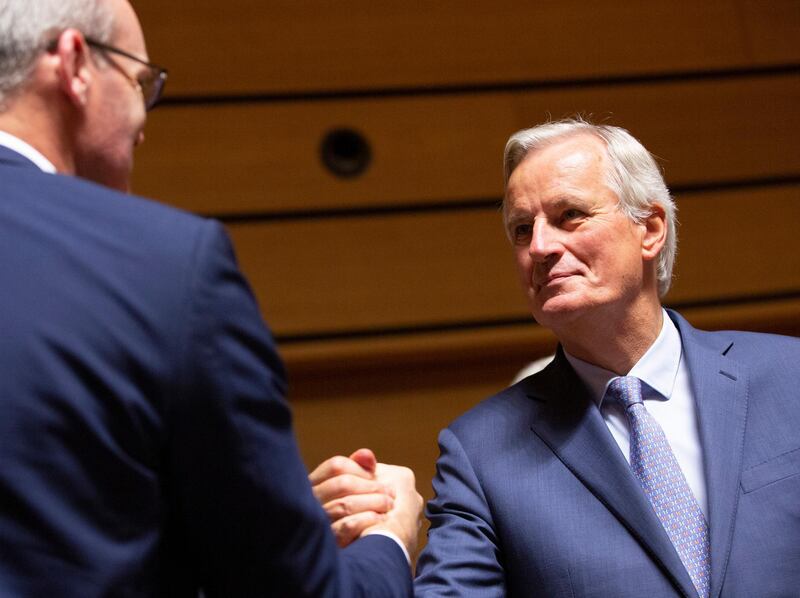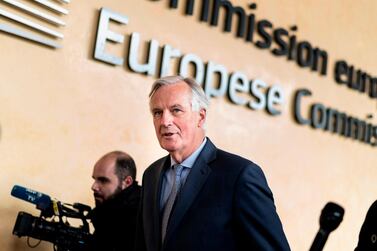British and EU officials edged closer to a last-minute Brexit deal on Tuesday evening, with talks due to continue into Wednesday and envoys from the bloc’s 27 remaining member states to meet with Michel Barnier, the EU’s chief negotiator.
British and EU leaders are looking to sign off on a Brexit deal at the EU summit in Brussels on Thursday and Friday.
Mr Barnier is scheduled to meet the 27 envoys at 2pm in Brussels on Wednesday to brief them on Britain's latest proposals.
On Tuesday, the start of "tunnel" negotiations to draw up a draft agreement sparked a rally in the pound as analysts reduced the risk of a no-deal Brexit.
The currency was holding on to gains above $1.26 on foreign exchanges in the late afternoon.
The concessions in the deal centred on a special Customs arrangement for Northern Ireland, which would protect cross-border trade through a complex rebate arrangement on goods traded through the post-Brexit UK.
Leaders from the Northern Irish Democratic Unionist Party met British Prime Minister Boris Johnson late on Tuesday in Downing Street to try to reach an agreement over the UK's departure from the bloc.
"We respect the fact negotiations are ongoing therefore cannot give a detailed commentary, but it would be fair to indicate gaps remain and further work is required," the party said after the 90-minute meeting.
It has consistently opposed any Customs checks between Northern Ireland and the rest of the UK, but the British government and the EU have repeatedly insisted that there can not be a hard border within the island of Ireland.
Officials in the Brexit discussions rated the chances of a breakthrough as much better than a week ago, but warned the text worked out on the basis of a UK proposal was a work in progress.
Mr Johnson postponed a Cabinet meeting until Wednesday but met senior colleagues to consult on the British concessions.
“This isn’t the time for optimism or pessimism,” Simon Coveney, the Irish Deputy Prime Minister, said after a briefing with Michel Barnier, the EU negotiator.
“The negotiating teams have made progress but it’s been slow.”
Mr Coveney, also Ireland's Foreign Minister, said that even if the talks made progress there could be a second EU summit before the end of October to finalise the Brexit deal.
"It is, of course, possible to move beyond the summit and continue talks next week," he said. "That is feasible because the UK isn't due to leave the EU until the end of the month.
"From everybody's perspective, if we could provide clarity at this leaders' summit, that would be a welcome development."
Mr Johnson said he had productive talks with French President Emmanuel Macron, who took a hard line on restricting British access to EU markets after Brexit.
"The prime minister said that in advance of the EU council, UK officials would continue to work hard on securing a deal," a Downing Street spokesman said.
Mr Barnier told the EU ambassadors that the talks had been difficult and that all options, including another delay to the British departure, were still open.
"Reaching an agreement is still possible," he said. "Obviously any agreement must work for everyone, the whole of the UK and the whole of the EU – a deal tonight, an extension or a breakdown."
Investment banks have been reassessing the risks of Brexit with JPMorgan telling its clients to pare back provisioning for a sterling downturn triggered by a no-deal departure.
A note prepared by Goldman Sachs also looked at a last-minute breakthrough.
“Our economists think enough MPs would likely be persuaded to vote in favour of this amended deal, and they maintain their baseline expectation of an orderly Brexit by the end of October,” the assessment said.
“In addition to a sterling appreciation, our economists argue that in a ‘deal’ scenario, business investment would recover a substantial proportion of the losses incurred over the past three years.”
European ministers have concerns that concessions on Northern Ireland could leave a hole in the single market rules that underpin the bloc's economic model.
Stef Blok, the Dutch Foreign Minister, said the Irish border must not allow "unfair competition" from countries outside the EU.
“Of course, the UK government has some steps but not enough to guarantee the integrity of the common market,” Mr Blok said.
“We hope the remaining steps will be set in the coming hours or days.”







